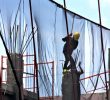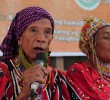Leaders of business, legal and progressive groups are elated over the Supreme Court�s decision junking the petition for a �people�s initiative� to change the Constitution. But, they warn, the fight to protect the charter from vested political interests is not yet over. Davao Today�s Cheryll D. Fiel and Grace S. Uddin report.
Related stories:
Ermita: SC Decision on People’s Initiative Not a Total Setback to Cha-Cha Movement
Satur Hails SC Ruling vs. Palace Initiative
�Best News of the Century� � Pimentel
Beltran Hails Supreme Court Decision Against People�s Initiative Petition
DAVAO CITY � The decision earlier today by the Supreme Court junking the �people�s initiative� to amend the Constitution has been met with elation by members of the business community, lawyers and leaders of progressive organizations, who called it a �victory for the people.�
But they pointed out that the fight to protect the Constitution is not yet over, warning that the administration of President Gloria Macapagal-Arroyo will do everything it can to push through with its plan to change the form of government to benefit vested political interests.
“The Supreme Court has to be congratulated,� said Bienvenido Carriaga, the president of the Davao City Chamber of Commerce and Industry Inc. The decision, he told davaotoday.com, �is very correct,� that it is �acceptable to the people� and that the �business community is happy.�
The administration�s �people�s initiative,� Carriaga said, �is not really the people’s initiative. That is the initiative of politicians. That is the initiative of Malaca�ang.” Carriaga said his colleagues at the chamber, who were having a board meeting when they heard the news, shared his view.
In an en banc decision, the Supreme Court voted 8-7 denying the petition for a �people�s initiative� by the groups Sigaw ng Bayan and the Union of Local Authorities of the Philippines (Ulap). A spokesperson for the High Court told reporters in Manila that the petitioners failed to convince the judges of their arguments. The petition, the decision said, was not for amendments but for the total overhaul of the charter.
The judges also noted irregularities in the way the petitioners gathered the signatures purportedly supporting the initiative. For one, according to the court�s spokesperson, the petitioners did not present to the signatories the changes they had wanted in the charter.
Leaders of progressive organizations, meanwhile, said the dismissal of the petition �is a victory for the Filipino people.� Jeppie Ramada, secretary-general of Bayan Muna in Southern Mindanao, noted that the fact that the decision is 8-7 showed the �the great pressure� exerted by Malacanang on the judges.
Omar Bantayan, secretary-general of the Kilusang Mayo Uno in the region, said the people�s initiative �was not really the people�s but �only House speaker Jose De Venecia�s and other bureaucrats in power.� De Venecia has been pushing for a change to a parliamentary system of government so that, according to his critics, he can become prime minister.
The Kabataan Youth Party in the region, meanwhile, lauded the Supreme Court decision, saying that, by siding with the people and defending their rights, the court has restored the credibility of the judiciary.
Jamail Lunar Macla, the regional coordinator of Kabataan Party in Southern Mindanao, said the youth sector has reason to fear a change in the Constitution because some suggested amendments would hasten the privatization and commercialization of education. This, he said, would be a burden to poor Filipinos.
But lawyer Carlos Isagani Zarate of the Union of Peoples’ Lawyers in Mindanao cautioned the public, saying the people should keep watching the moves to amend the charter.
Nothing is final yet, he told davaotoday.com, unless the next 15 days passed without anyone filing a motion for reconsideration. Raul Lambino, one of the petitioners, said on television tonight that he was definitely filing a motion for reconsideration and that, according to him, the fight has just begun.
Carriaga, however, thinks that it would be unlikely for the court to overturn itself in this case. “In my 43 years as a practicing lawyer, I have not heard of the Supreme Court reconsidering its decision, especially on issues like this, which are of utmost national importance,” he said.
Zarate said the administration still has an ace up its sleeve, the constituent assembly. “The president may call for a joint session and constitute the Congress and Senate into a constituent assembly,” he said. The downside to this approach, he said, is that all this will not be possible within the year. “When Congress convenes, they would have to pass a new law and get those signatures all over again.”
Carriaga believes this process may take a year or so, thereby ruling out a possible “no election” scenario, as had been feared.
As far as the Davao City chamber is concerned, Carriaga said, the amendments should be through a constitutional convention. “There is no need to rush,� he said. �This is something very important and has to be deliberated upon.”
He explained that while the Constitution makes it difficult for a president to become a dictator (a president only serves one term under the present charter), there are provisions that “do not conform with the changing times.”
Among these are the term limits on government officials. “Three terms, for instance, is too short for a good government official,” Carriaga said, citing Davao City Mayor Rodrigo Duterte as an example.
Carriaga also said charter change will eventually benefit industries in the country, foremost of them mining.
“No Filipino would be willing to put up capital for mining. It’s the foreigners who are in the best position to do it,� he said, explaining why foreign mining companies should be given more leeway to invest in the industry.
There are also laws in the present charter that do not augur well for the country’s agriculture sector, Carriaga pointed out.
For instance, he believes production shortfalls in major crops are caused by the policy of subdividing lands into small portions as required by the land-reform law. “In effect, the small farmers hardly stand any chance to get bank loans because they could not come up with the required collateral,” he explained. Farmers, he said, could hardly afford the resources to ensure profitable production.
But nationalist groups are wary about these proposed changes, arguing that they tend to benefit big capitalists and foreign companies, to the detriment of most Filipinos, particularly the poor.
Bantayan, of the KMU, said that despite the flaws of the 1987 Constitution, it still has remaining provisions that uphold the national interest. (Cheryll D. Fiel and Grace S. Uddin/davaotoday.com)










